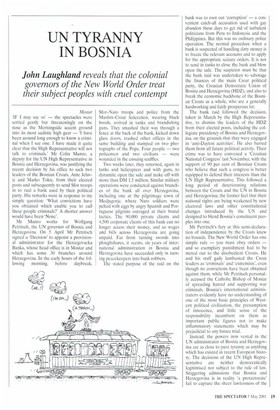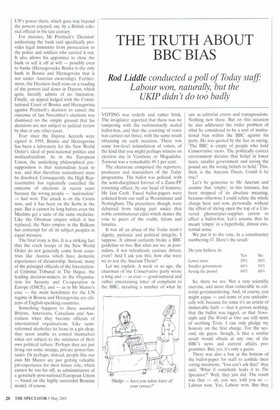UN TYRANNY IN BOSNIA
John Laughland reveals that the colonial governors of the New World Order treat their subject peoples with cruel contempt
Mostar IF I may say so' — the spectacles were settled gently but threateningly on the nose as the Morningside accent ground into its most sadistic high gear — 'I have been around long enough to know a criminal when I see one. I have made it quite clear that the High Representative will not talk to criminals.' Mr Colin Munro. a deputy for the UN High Representative in Bosnia and Herzegovina, was justifying the recent decision by his office to sack two leaders of the Bosnian Croats, Ante Jelavic and Marko Tokic, from their elected posts and subsequently to send Sfor troops in to raid a bank used by their political party. His remarks were in response to my simple question: `What convictions have you obtained which enable you to call these people criminals?' A shorter answer would have been 'None'.
Mr Munro works for Wolfgang Petritsch, the UN governor of Bosnia and Herzegovina. On 5 April Mr Petritsch signed a 'Decision' to appoint a provisional administrator for the Hercegovacka Banka, whose head office is in Mostar and which has some 30 branches around Herzegovina. In the early hours of the following morning, before daybreak, Sfor-Nato troops and police from the Muslim-Croat federation, wearing black hoods, arrived in tanks and brandishing guns. They smashed their way through a fence at the back of the bank, kicked down glass doors, trashed other offices in the same building and stamped on two photographs of the Pope. Four people — two policemen and two civilians were wounded in the ensuing scuffles.
Two weeks later, they returned, again in tanks and helicopters and with guns, to dynamite open the safe and make off with more than DM 1.5 million, Similar military operations were conducted against branches of the bank all over Herzegovina, including one at the pilgrimage town of Medjugorje, where Nato soldiers were pelted with eggs by angry Spanish and Portuguese pilgrims outraged at their brutal tactics. The 90,000 private clients and 4,500 corporate clients of this bank can no longer access their money, and so wages and bills across Herzegovina are going unpaid. Far from turning swords into ploughshares, it seems, six years of international administration in Bosnia and Herzegovina have succeeded only in turning peacekeepers into bank robbers.
The stated purpose of the raid on the
bank was to root out 'corruption' — a convenient catch-all accusation used with gay abandon these days to get rid of turbulent politicians from Peru to Indonesia and the Philippines. But this was no ordinary police operation. The normal procedure when a bank is suspected of handling dirty money is to freeze the relevant accounts and to apply for the appropriate seizure orders, It is not to send in tanks to close the bank and blow open the safe. The suspicion must be that the bank raid was undertaken to sabotage the finances of the main Croat political party, the Croatian Democratic Union of Bosnia and Herzegovina (HDZ), and also to break the economic backbone of the Bosnian Croats as a whole, who are a generally hardworking and fairly prosperous lot.
The bank raid followed the decision, taken in March by the High Representative, to dismiss the leaders of the HDZ from their elected posts, including the collegiate presidency of Bosnia and HerzegovMa, on the grounds that they were engaged in 'anti-Dayton activities'. He also barred them from all future political activity. Their crime was to have convened a 'Croatian National Congress' last November, with the support of 90 per cent of Bosnian Croats who believe that such a congress is better equipped to defend their interests than the UN High Representative. This followed a long period of deteriorating relations between the Croats and the UN in Bosnia and Herzegovina; the former feel that their national rights are being weakened by new electoral laws and other constitutional changes introduced by the UN and designed to blend Bosnia's constituent peoples into one.
Mr Petritsch's fury at this semi-declaration of independence by the Croats knew no bounds. The New World Order has one simple rule — you must obey orders — and so exemplary punishment had to be meted out to the disobedient Croats. He and his staff gaily lambasted the Croat leaders as 'criminals' and 'extremists', even though no convictions have been obtained against them, while Mr Petritsch personally accused the Catholic Bishop of Mostar of spreading hatred and supporting war criminals. Bosnia's international administrators evidently have no understanding of one of the most basic principles of Western political civilisation, the presumption of innocence, and little sense of the responsibility incumbent on them as important public figures not to make inflammatory statements which may be prejudicial to any future trial.
Instead, the powers now vested in the UN administrator of Bosnia and Herzegovina are as close to pure tyranny as anything which has existed in recent European history, The decisions of the UN High Representative are neither democratically legitimised nor subject to the rule of law. Sniggering admissions that Bosnia and Herzegovina is in reality 'a protectorate' fail to capture the sheer lawlessness of the UN's power there, which goes way beyond the powers enjoyed, say, by a British colonial official in the last century.
For instance, Mr Petritsch's 'Decision' authorising the bank raid specifically provides legal immunity from prosecution to the police and soldiers who carried it out. It also allows his appointee to close the bank or sell it off at will — possibly even to banks (Hercegovacka Banka is the only bank in Bosnia and Herzegovina that is not under Austrian ownership). Furthermore, the Decision itself rests on a reading of the powers laid down in Dayton, which quite literally admits of no limitation. Finally, an appeal lodged with the Constitutional Court of Bosnia and Herzegovina against Petritsch's decision to cancel the outcome of last November's elections was dismissed on the simple ground that his decisions are not subject to judicial review by that or any other court.
Ever since the Dayton Accords were signed in 1995, Bosnia and Herzegovina has been a laboratory for the New World Order's ideal of post-national politics and multiculturalism. As in the European Union, the underlying philosophical presupposition is that nationalism leads to war, and that therefore nationhood must be dissolved. Consequently. the High Representative has repeatedly cancelled the outcome of elections in recent years because the wrong people — 'nationalists' — had won. The attack is on the Croats now, and it has been on the Serbs in the past. But it cannot be long before even the Muslims get a taste of the same medicine. Like the Ottoman empire which it has replaced, the Nato empire in the Balkans has contempt for all its subject peoples in equal measure.
The final irony is this. It is a striking fact that the crack troops of the New World Order do not generally come from countries like Austria which have domestic experiences of dictatorship. Instead, many of the principal officials of the International Criminal Tribunal in The Hague, the leading decision-makers in the Organisation for Security and Co-operation in Europe (OSCE), and — as in Mr Munro's case — the main henchmen for the UN regime in Bosnia and Herzegovina are citizens of English-speaking countries.
Something happens to these assorted Britons, Americans, Canadians and Australians when they become officials of international organisations. Like semireformed alcoholics let loose in a gin shop, they seem unable to control themselves when not subject to the strictures of their own political culture. Perhaps they are just living out some strange, private power-fantasies. Or perhaps, instead, people like our own Mr Munro are just getting valuable job-experience for their future role, which cannot be too far off, as administrators of a genuinely post-national European Union — based on the highly successful Bosnian model, of course.











































































 Previous page
Previous page